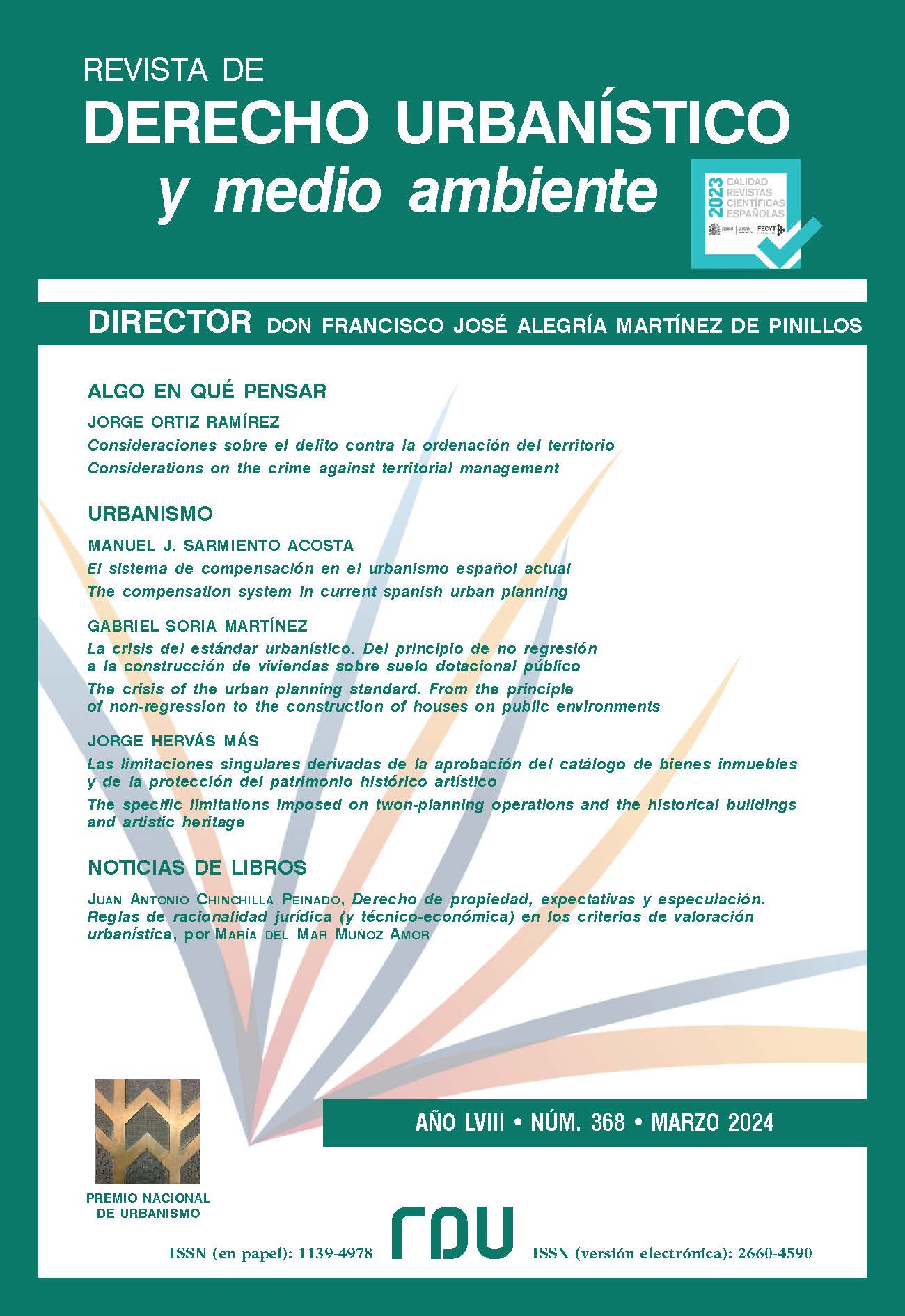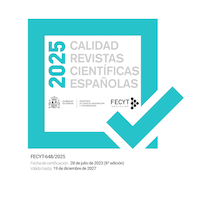The crisis of the urban planning standard. From the principle of non-regression to the construction of houses on public environments
Keywords:
Sustainability, standard, urban quality, non-regression, patrimonialization, public endowment, reversion, transfer, donationAbstract
The imposition of an urban quality standard by Laws constitutes a social achievement that guarantees citizens’ access to sufficient public services in cit- ies. By their nature, public facilities constitute the headquarters for the provi- sion of public services with a general purpose. The principle of non-regression, under the ‘stand still’ formula, which has been reiterated ad nauseam in matters of green areas and open spaces by jurisprudence, is applicable to all endowment lands, which respond to the imperative of reserving spaces to serve the basic needs of those who inhabit the urban space. The patrimonialization of public land, even if it is to build public housing, causes an increase in pressure on public services, which, in accordance with the model of sustainability and provision actions, re- quires increasing the provision spaces, not reducing them. It is one thing to pro- vide for the implementation of temporary public accommodation services to meet the demand for housing solutions of specific vulnerable people and
another to promote housing by altering the balance of the standard and degrading urban quality contrary to Planning forecasts. Aside from this, can the reversion be ap- plied in favor of those who gave up land for free to implement specific provisions if it is negotiated with to promote housing?
Downloads
References
BASSOLS COMÀ, Martín. Derecho Urbanístico y Medio Ambiente Urbano. Revista de Derecho Urbanístico, nº 71.
CAÑIZARES RUIZ, Mª Carmen, Medio Ambiente Urbano. Conceptualización y Aplicación a la Ciudad de Puertollano (Ciudad Real).
Publicado por el Consejo Superior de Investigaciones Científicas. Estudios Geográficos LXII 242, 2001.
GARCÍA DE ENTERRÍA, Eduardo, y PAREJO ALFONSO, Luciano. Lecciones de Derecho Urbanístico, Editorial Civitas, Madrid, 1981.
GÓMEZ-FERRER MORANT, Rafael. En torno a los estándares urbanísticos, REDA, nº 4, 1975.
GONZÁLEZ ROMERO, Gonzalo. En torno a la Problemática de los Equipamientos publicado en la misma Revista de Derecho Urbanístico,
nº 51.
GONZÁLEZ SANFIEL, Andrés Manuel, El Principio de No Regresión en el Derecho Público. Urbanismo y Edificación nº 2/2022, Monografías. Ed. Thomson Reuters. Aranzadi, pág. 21.
GONZÁLEZ-VARAS IBÁÑEZ, Santiago. Los estándares urbanísticos. Estudio sobre las densidades edificatorias. Estudios y Comentarios
Legislativos. Tratado de Derecho Administrativo. Tomo V. Editorial Civitas, SA, Enero de 2012.
JIMÉNEZ DE CISNEROS, Francisco Javier. La Incidencia de las Leyes Sectoriales Estatales en la Calificación Urbanística de Dotaciones
Públicas. Curso sobre régimen jurídico de las dotaciones públicas y obtención de terrenos dotacionales, organizado por la
Revista de Derecho Urbanístico (RDU) y CEJUS, Madrid, 1995.
LASO MARTÍNEZ, José Luis y LASO BAEZA, Vicente. El Aprovechamiento Urbanístico. Editorial Marcial Pons. 1995, pág. 131.
LÓPEZ MORENO, Juan Luis. Dotaciones Equipamientos Urbanísticos, Editorial Montecorvo.
LÓPEZ BENÍTEZ, Manuel. Estándares urbanísticos y normas de directa aplicación, en Diccionario de Derecho Administrativo, Tomo I,
Muñoz Machado, Santiago (Director).
PELLICER CORELLANO, Francisco. El Medio Ambiente Urbano: Interfase Naturaleza y Cultura. Escuela Técnica Superior de Arquitectura
del Vallès (http://www-etsav.upc.es/).
PONS GONZÁLEZ, Manuel, ARCO TORRES, Miguel Ángel. Diccionario de Derecho Urbanístico. Granada. Editorial Comares.
SORIA MARTÍNEZ, Gabriel. La valoración del suelo en actuaciones estatales y sectoriales. Revista de Derecho Urbanístico y Medio Ambiente, Nº 195, 2002, págs. 99-131.
SORIA MARTÍNEZ, Gabriel. La Ciudad Sostenible. Crítica Al Oximorón Decrecimiento-Sostenibilidad. RDUyMA nº 364, sept.-oct. 2023.






